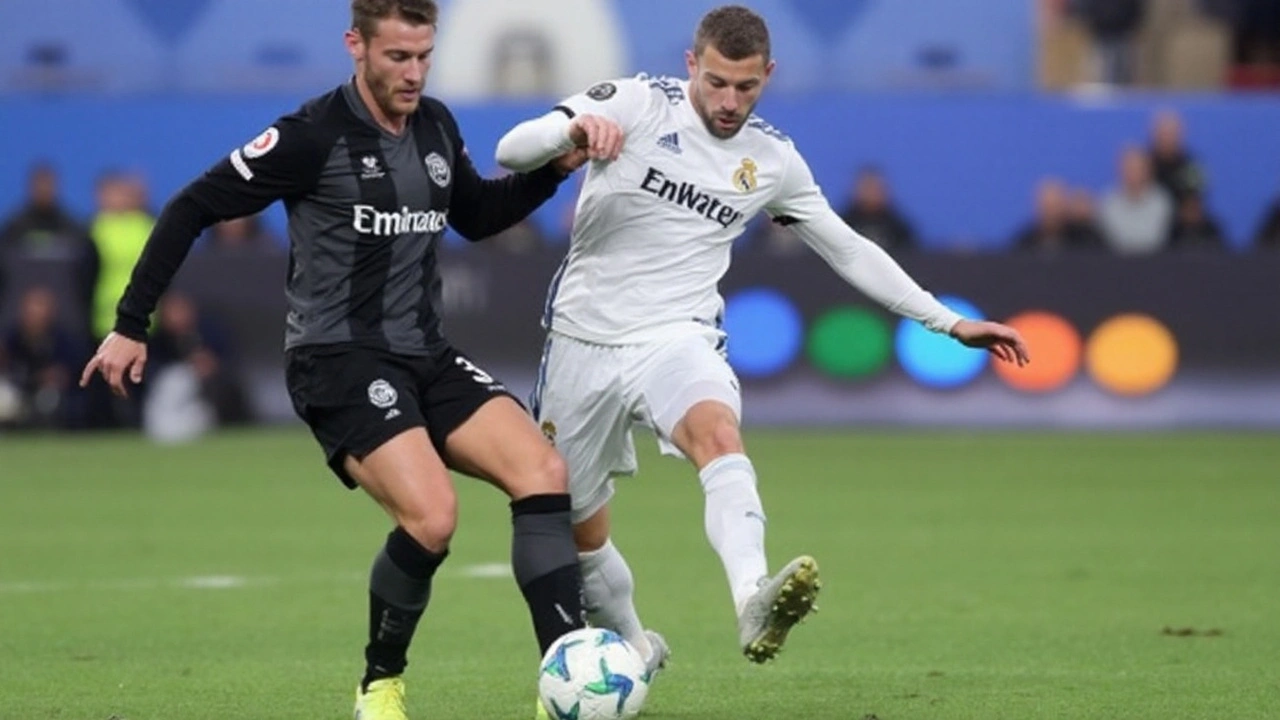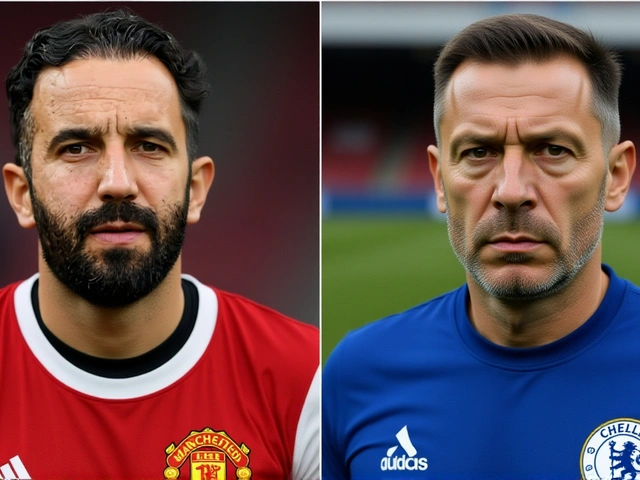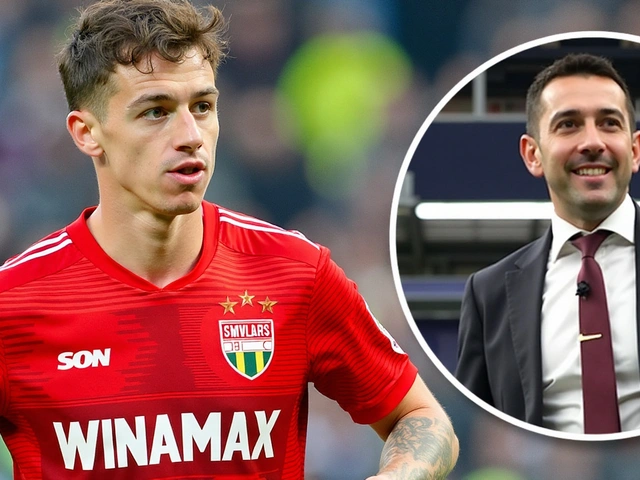
Madrid’s cool head, Frankfurt’s fight, and a record in Helsinki
Another European final, another Real Madrid win. A calm 2-0 over Eintracht Frankfurt at the Olympic Stadium in Helsinki handed the Spanish champions their fifth UEFA Super Cup, tying AC Milan and Barcelona for the most titles in the competition. David Alaba struck before half-time, and Karim Benzema finished the job after the break. On the touchline, Carlo Ancelotti quietly made more history too—this was his fourth Super Cup as a coach, the most by anyone.
Frankfurt arrived with a clear plan and plenty of energy in their first-ever appearance in this fixture. Oliver Glasner rolled out a compact 5-4-1, lines tight, wingers tucked in, and the single forward ready to sprint into space. For the first 20 minutes, it worked. They pinched midfield spaces, broke quickly, and forced Thibaut Courtois into staying sharp. Daichi Kamada and Jesper Lindstrøm both found gaps, and there was just enough threat on transitions to keep Madrid honest.
Then the game tilted. Vinícius Júnior woke up the left flank. In the 17th minute he slipped through and thought he’d scored, only for Tuta to clear off the line. Kevin Trapp kept Frankfurt afloat with strong saves, reading low shots and closing angles at speed. But Madrid were finding rhythm: Toni Kroos set the tempo, Luka Modrić drifted into pockets, and Federico Valverde widened the pitch on the right. The pressure felt steady, not frantic—Madrid’s usual way of turning a final into their kind of game.
The breakthrough came on a set piece in the 37th minute. Frankfurt defended the first ball, but the second phase killed them. Casemiro battled to keep the chance alive, and the ball fell for Alaba, who tapped into an open net from close range. One-nil, and the mood changed. Frankfurt’s shape had been solid, but falling behind to Madrid brings a different kind of stress: the fear of overcommitting, the risk of being punished for one loose pass.
After the restart, Madrid looked even more comfortable. The back four—Dani Carvajal, Éder Militão, Alaba, and Ferland Mendy—stepped higher, and the midfield squeezed Frankfurt’s outlets. Casemiro nearly scored a stunner from distance, his swerving strike clanging off the bar. The second goal arrived in the 65th minute, a clean, simple finish from Benzema after a sharp Vinícius assist. One touch to set, one to steer it past Trapp. Efficient, inevitable.
That goal mattered beyond the night. It moved Benzema to 324 goals for Madrid, taking him past Raúl into second on the club’s all-time list. Only Cristiano Ronaldo, with 450, sits ahead. Benzema didn’t need fireworks to make his point; he just did what he does—smart movement, ruthless finish, another trophy.
To their credit, Frankfurt never folded. Trapp turned away more danger—another effort from Vinícius, a skidding shot from Valverde, a late poke from Modrić. Glasner’s side kept trying to spring runners into space, but the support was often a beat too slow. When they did find a lane, Militão and Alaba cut it off, or Courtois swallowed the cross. This was a lesson in what happens when a savvy team protects a lead without panic.
Casemiro walked off with the MVP award, and it fit the story of the match. He broke up counters early, won second balls, fed forward runners, and set the tone physically without getting reckless. He also had a hand in the opener and nearly added a screamer. On nights like this, the big moments come from Madrid’s stars, but the base is built by the No. 6 who never stops organizing everything around him.
Ancelotti’s bench offered another subplot. Aurélien Tchouaméni and Antonio Rüdiger both made competitive debuts after summer moves, coming on late to see the game out. Tchouaméni’s touches were neat and safe in midfield, while Rüdiger brought his usual intensity to the back line. Neither had to do anything dramatic, and that’s exactly what Madrid wanted—fresh signings settling into a winning routine rather than chasing a result.
The stage delivered something new too. This was the first European club game to use Semi-Automated Offside Technology (SAOT), a limb-tracking system that speeds up offside checks. With 12 cameras mapping player points 50 times per second and sending instant alerts to the VAR, the idea is simple: faster decisions, fewer long pauses, and clear 3D replays for broadcasters. It didn’t hijack the game—no drawn-out stoppages, no confusion—just a quiet step toward making VAR less clunky.
Helsinki added a clean backdrop for all of this. The surface was quick, the atmosphere light but focused, and Madrid fed off the calm. Finals can get wild. This one never did because Madrid never let it. They cycled the ball when they needed rest, went direct when space opened up, and trusted their senior players to manage the tempo without forcing plays that weren’t on.
Vinícius was a constant threat. He kept dragging Frankfurt’s back line wide, pulling defenders into awkward foot races, and playing the last pass at the right time. When he didn’t get shots, he drew bodies, which opened lanes for Benzema and Valverde. On the flip side, Frankfurt missed a consistent outlet on their left. They could build to halfway, but breaking Madrid’s final third block took extra precision they couldn’t find often enough.
Madrid’s midfield triangle told the rest of the story. Kroos and Modrić dictated where the ball went; Casemiro determined when Frankfurt could go anywhere. When the German side tried to switch play, Kroos shuffled early and clipped momentum with a simple foul or a smart hold-up pass the other way. When Modrić carried through the right half-space, Valverde’s run dragged a wing-back, leaving a pocket for Carvajal to underlap or for Benzema to drop into. It wasn’t flashy. It was just the kind of functional dominance that wears opponents down.
Eintracht will still take pieces from this. Their defensive shape for 35 minutes kept Madrid uncomfortable, and their early counter patterns created real looks. Jesper Lindstrøm found promising positions between lines, and Kamada’s timing gave Madrid center-backs problems until the game state changed at 1-0. For a team building on a Europa League title, this was a reminder of the small margins at the top. Stay compact, yes—but the second phase after set pieces and the first pass after ball recoveries decide whether you hang in or get picked off.
Why it matters: records, debuts, and what comes next
Five Super Cups puts Madrid level with the competition’s all-time leaders, and the pattern is familiar: win the Champions League, show up in August, and handle the job with minimum drama. Ancelotti’s fourth Super Cup as a coach sets him apart, and it lines up with a career built on balance—never overcomplicating when simplicity works. This squad also keeps stacking hardware: the Spanish Super Cup, LaLiga, the Champions League, and now this. Four major trophies in the same calendar year is a serious statement before the new season even gets moving.
For Benzema, the numbers speak, but his influence stretches beyond goals. He drops in to knit play, he lures center-backs into zones they don’t want to enter, and he trusts the wide players to finish moves he starts. Passing Raúl is symbolic—longevity, consistency, and leadership rolled into one. With Vinícius accelerating into his prime and Valverde offering vertical power, Madrid’s attack looks balanced in ways that suit their captain’s brainy game.
Casemiro’s MVP ribbon points at a larger question Madrid must manage over a long season: how to blend the old guard with new legs. Tchouaméni will get minutes at the base of midfield. Eduardo Camavinga offers energy as an eight. But nights like this showed why the veterans still own the biggest stages. They read the flow, trim risk, and squeeze a final until it fits into their comfort zone.
Frankfurt, just months removed from lifting the Europa League, can frame this as another rung up the ladder. The system is clear, the work rate is there, and the keeper is elite. If they sharpen the first pass out of pressure and get more support running off the striker, they’ll turn more of those half-counters into real chances. European experience is earned the hard way; they’re in the middle of that process.
There’s also the tech story. SAOT will roll out across top UEFA competitions, aiming to cut long pauses for offside checks and give fans quicker clarity. The tool still needs a human final call, but the data feed shortens the wait and reduces guesswork. In Helsinki, it stayed out of the spotlight—that’s the best sign a new system worked.
As for the bigger picture, Madrid look ready for the grind ahead. The bench is deeper, the core understands their roles, and the habit of finishing finals hasn’t faded. Frankfurt leave with a clean read of what their next step looks like. Both teams head back to domestic action with clearer maps of who they are—and for Madrid, with another piece of silver sitting in the cabinet.
15 Comments
Write a comment
More Articles

Manchester United 2-1 Chelsea in Rain‑Soaked Old Trafford Thriller
Manchester United beat Chelsea 2-1 at rain‑soaked Old Trafford on Sep 20, 2025, easing pressure on manager Ruben Amorim and extending Chelsea's winless run at the stadium.

AC Milan Considers Stuttgart's Angelo Stiller as Key Midfield Solution
Reports suggest AC Milan's Geoffrey Moncada admires Stuttgart's Angelo Stiller, considering him for midfield enhancement. With Ismael Bennacer injured, Milan seeks depth in midfield, primarily occupied by Youssouf Fofana and Tijjani Reijnders. The team explores options, including Stiller, to support their midfield strategy amidst links with players like Warren Bondo and Morten Frendrup.

Governor Makinde Confirms Prince Abimbola Owoade as Alaafin of Oyo, Signaling a New Era
Governor Seyi Makinde has approved Prince Abimbola Akeem Owoade as the new Alaafin of Oyo, following a thorough selection by the Oyomesi kingmakers. Prince Abimbola, from the respected Owoade-Agunloye family, holds significant academic and professional credentials. His appointment, succeeding the late Oba Lamidi Adeyemi III, promises a prosperous future for Oyo Kingdom amid preceding controversies around the selection.
abhishek singh rana
September 12, 2025 AT 17:32Real Madrid showed why they are a powerhouse, they kept cool, they moved the ball, they scored. The first goal was a set piece, Alaba was in the right spot, the pass was crisp. Courtois had to stay alert, he made a few good saves, but nothing changed. The win ties them with Milan and Barcelona for the most Super coups, that’s big.